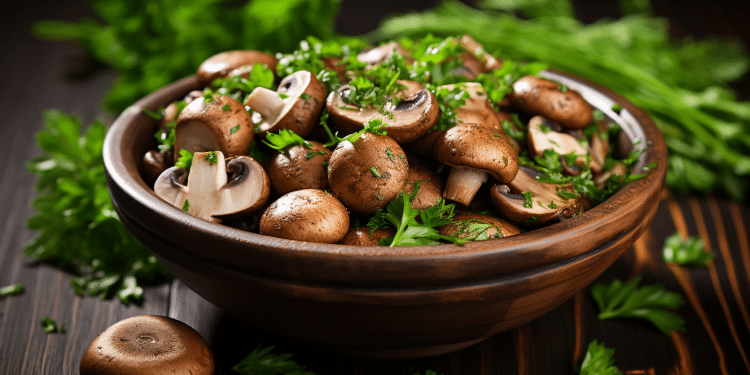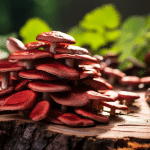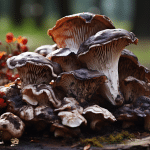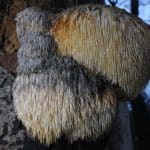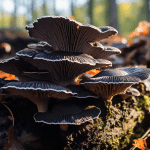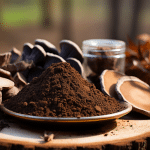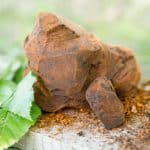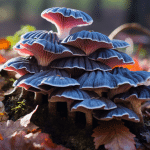Mushrooms are delicious sources of healthful nutrients, and humans have used them for thousands of years, both for flavor and for their health benefits. People use keto friendly mushrooms rich, earthy flavors to bolster a variety of dishes. They also make a great alternative protein source for vegetarians and vegans.
But, you might wonder, “are mushrooms OK to eat on keto?”. In this post, we are going to answer that question.
We also cover carbs in mushrooms, and the best types of mushrooms to use on the keto diet. But before we do, let us quickly review what keto is.
What is the Ketogenic Diet?
Keto is an abbreviation of ketogenic, and it is a type of diet. A ketogenic diet, or keto, is a low-carb, high-fat diet with moderate amounts of protein.
A keto diet replaces carbohydrates with fats and puts your body in a metabolic state called ketosis. In this state, your body burns fat for energy instead of glucose.
The keto diet originated as a way to help treat children’s epileptic seizures. But these days, it is more common for people to use this popular diet for weight loss and for helping to treat Type 2 diabetes. To stay in ketosis, most people who follow the keto diet must restrict total daily carbohydrate consumption to fewer than 1.76 ounces (50 grams) per day.
Learn more: Is eating mushrooms good for you?
It is useful to be aware of your carbohydrate intake for favorite foods, including tasty, versatile mushrooms. Many who are looking for tasty, nutrient-dense foods that they can eat on the keto diet are wondering, are there any mushrooms that are keto-friendly?
Are Mushrooms Keto-Friendly?
Yes, mushrooms are keto-friendly, and they are a great way to add some extra nutrients and fiber into your keto diet. What makes mushrooms keto-friendly is that they are low in net carbs, which allows people to incorporate them into their meals without exceeding daily carb limits. Mushrooms are low not just in carbohydrates, but also in calories and fat. But they are high in vitamins, minerals and protein, making them a perfect complement to any keto meal. You can enjoy different types of mushrooms safely on a keto diet.
Yes, mushrooms are great for keto, one of the healthiest low-carb foods that you can eat while following the keto diet. Let us take a look at some of the nutrient and health benefits of including mushrooms on your keto diet.
Health Benefits of Keto Friendly Mushrooms
White button mushrooms are among the most widely available mushrooms, accounting for more than 40% of mushroom production globally. People often call mushrooms “functional foods” because they can provide potential positive effects outside of a basic diet. They are low in sodium, cholesterol, fat, and carbohydrates, making them ideal to consume as part of your keto diet.
- 20 calories
- 0 grams of fat
- 3 grams of protein
- 1 gram of fiber
- 23% daily value of vitamin B2 (Riboflavin)
- 17% daily value of vitamin B3 (Niacin)
- 14% daily value of vitamin B5 (Pantothenic Acid)
- 13% daily value of selenium
- 13% daily value of copper
- 9% daily value of potassium
- 8% daily value of phosphorus
Most edible mushrooms share similar nutritional profiles, no matter the shape, size, or color. There are a number of health benefits to eating mushrooms, making them one of the more ideal low-carb vegetables to follow on the keto diet. Which brings us to our next major question, what types of mushrooms are allowed on the keto diet.
Learn more: Mushroom benefits for hair skin wellbeing
The Best Types of Mushrooms For a Keto Diet
All types of mushrooms are allowed on the keto diet, but some are slightly lower in carbs than others, making them a better choice for keto. We do not digest fiber, so it is generally not included in calculating your carb count on keto. The below mushroom carb values are net carbs, which are total carbs minus fiber.
White or Button Mushrooms
White button mushrooms, are the most widely consumed mushrooms in the world, and their low carb content makes them ideal for the keto diet. If you compare the net carbs of a 3.5-ounce (100-gram) serving of these mushrooms with those of morel mushrooms, another healthy, keto-friendly food, the two are almost identical. Raw white mushrooms contain 0.08oz (2.3g) of net carbs in a 3.5oz (100g) serving.
Morel Mushrooms
People sometimes describe morel mushrooms unique flavors as nutty or woodsy, with a tough, meaty texture. Morels are extremely difficult to grow, and folks more commonly hunt for them in the wild, making them one of the most sought-after mushrooms in the world.
These particular mushrooms will be a delicious treat for anyone following a keto diet, since they are low in carbs. Raw morel mushrooms contain 0.08 ounces (2.3 grams) of net carbs in each 3.5-ounce (100-gram) serving.
Portabella Mushrooms
When you let the button mushroom mature completely, it will grow a big, brown cap, a stronger flavor, and turn into a portabella. Portabella mushrooms, are great for the keto diet.
Try them filled with keto-friendly ingredients such as cream cheese, grated cheddar, or bacon, and you will have yourself a delicious keto treat. Portabella mushrooms are 0.09 ounces (2.6 grams) of net carbs per 3.5-ounce (100-gram) serving.
Chanterelle Mushrooms
Chanterelle mushrooms are among the worlds most sought-after mushrooms, and chefs value them for their flavor, color, and texture. Chanterelles are spongy, and have a velvety feel. They taste like dirt, maybe like a little bit of black pepper.
Cooking accents their flavors, making them an excellent addition to soups, sauces, quiches, and stir-fries. Raw chanterelle mushrooms provide 0.11 ounces (3.1 grams) of net carbs in each 3.5-ounce (100-gram) serving.
Mushrooms That Are Keto, But Have a Few More Carbs
The tasty mushrooms below are still excellent on the keto diet, but they do come with slightly higher carb counts, though most are still lower in carbs than onions. You will have to watch the amount to ensure that you are staying within your daily carb cap, or maybe try using mushrooms in place of onions for a different type of flavor in the dish. Compare the net carbs of the below 3.5-ounce (100-gram) serving of mushrooms with those of onions, which are 0.17-ounce (4.8-gram) each.
Cremini Mushrooms
Cremini mushrooms are in the same family as button mushrooms or portobello mushrooms, but harvested at a different stage, falling in between when their first harvested and when they mature after 4-5 days. You can say button mushrooms are young heirloom mushrooms, while portabella mushrooms are mature heirloom mushrooms. Cremini mushrooms are milder, but they taste slightly more robust than button mushrooms, and they have a similarly mild texture. There are 0.13 ounces (3.7 grams) of net carbohydrates in one 3.5-ounce (100-gram) serving of uncooked cremini mushrooms.
Oyster Mushrooms
Oyster mushrooms are among the most consumed mushrooms worldwide. They taste mild, slightly earthy, and they produce a velvety texture when cooked. They are wonderful sautéed and served on their own, or you can use oyster mushrooms in recipes just like you would use white or button mushrooms. Commercial growers harvest oyster mushrooms year-round, so they are always available if your local shop or farmers market has them. Raw oyster mushrooms provide 0.13 ounces (3.8 grams) of net carbohydrates in each 3.5-ounce (100-gram) serving.
Shiitake Mushrooms
Shiitake mushrooms are the star ingredient of many types of Asian cooking, and they are generally more expensive than oyster mushrooms or button mushrooms. They have a richer, stronger taste than button mushrooms or portobello mushrooms, and you can find both fresh and dried shiitake mushrooms at stores. Their rich, meat-like flavor makes them a great substitute for meat in veggie-friendly dishes.
There are 0.15 ounces (4.3 grams) of net carbohydrates from a 3.5-ounce (100-gram) serving of raw Shiitake mushrooms.
Maitake Mushrooms
Maitake mushrooms are very popular in Japan and China because of the tasty flavor and the medical qualities. But, chefs around the world are seeking them out for their earthy flavor and flavor, unique texture, and pure versatility. Maitakes are fantastic sautéed, but they are also delicious when sautéed, roasted, or even fried, with that satisfying crunchy bite. There are 0.15 ounces (4.3 grams) of net carbohydrates in one 3.5-ounce (100-gram) serving of raw maitake.
Enoki Mushrooms
Enoki mushrooms have long, skinny stalks with tiny caps, and, similar to Maitake, are commonly used in Japanese and Chinese cooking as well. People like their mild flavors and crunchy, tough texture when they are served raw in salads or lightly fried, and they are frequently used in soups, risottos, and stir-fries.
There are 0.18 ounces (5.1 grams) of net carbohydrates per 3.5-ounce (100-gram) serving of raw enoki mushrooms.
